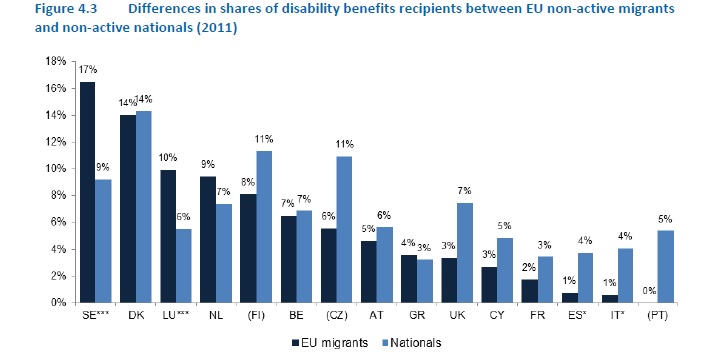Benefit tourism: the Commission gives us some facts
The Daily Telegraph (quickly followed by the Daily Mail) claimed yesterday that “an EU study has found 600,000 unemployed migrants are living in Britain..at a cost of £1.5 billion to the NHS alone”. They duly found a politician - Douglas Carswell MP - sufficiently gullible to take these figures at face value:
The Daily Telegraph (quickly followed by the Daily Mail) claimed yesterday that “an EU study has found 600,000 unemployed migrants are living in Britain..at a cost of £1.5 billion to the NHS alone”. They duly found a politician – Douglas Carswell MP – sufficiently gullible to take these figures at face value:
These figures show that the wave of benefit migrants has become a tsunami of economic refugees fleeing the eurozone crisis to try to find jobs here. We cannot both continue the free-at-the-point-of-use welfare state and benefits system and allow Europeans to flee the eurozone and come here.
Let’s just quietly ignore the fact that Mr Carswell doesn’t seem to realise that Poland (by far the largest source of EU migrants to the UK) is not, as it happens, a member of the eurozone. There has been an increase in the number of Spaniards and Italians moving here – some of them work here at NIESR – but I don’t think anyone’s noticed a “tsunami”.
The report itself was produced in response to this sort of overheated rhetoric, particularly from the UK government. Which makes it somewhat ironic that when asked to provide some actual evidence of the existence of “benefit tourism”, the Home Office response (according to the Telegraph) was that
We consider that these questions place too much emphasis on quantitative evidence
Undeterred by this rather cavalier attitude to facts, the researchers working for the Commission have produced a detailed 291 page compilation of figures. It has now been published, so what does it actually show?
First, the 600,000 figure simply reflects the fact that the Telegraph writer doesn’t know the meaning of the word “unemployed”. There are in fact two common usages in the UK
· People who are not currently employed and are looking for work (in the EU, this is measured by national Labour Force Surveys). Importantly, such people may or may not be claiming benefits, depending on whether they are entitled to them. In the UK, approximately 100,000 EU nationals are unemployed
· People who are claiming “unemployment benefit” (Jobseekers Allowance]. In the UK, according to the latest DWP figures, approximately 60,000 EU nationals are claiming JSA.
For comparison, the number of (non-UK) EU citizens resident in the UK is about 2.3 million. So where does the 600,000 figure come from? In fact, as the report explains clearly (page 3), it is the “non-active” population aged over 15 – this means everybody who is not currently employed. So most such people are not unemployed at all. They include students, pensioners, those with caring responsibilities (including stay at home parents), older schoolchildren etc. The corresponding figure for the UK population as a whole is 20 million or so, which puts the 600,000 figure in perspective.
So the 600,000 figure in itself tells us very little (except that neither the Daily Telegraph writers nor Douglas Carswell have even the most basic understanding of labour market statistics). But what is meaningful are the following statistics (accurate when the report was compiled):
· The “non-activity” rate among EU nationals in Britain is 30%. For UK nationals it is 43%;
· The unemployment rate among EU nationals in Britain is 7.5%. For UK nationals it is slightly higher, at 7.9%;
· The employment rate (for those age 16-64) among EU nationals is 77%. For UK nationals it is 72%;
· Approximately 4% of JSA claimants in the UK are EU migrants, although they represent well over 5% of those in work.
All this paints a very consistent picture, albeit not one you’d have got from the Telegraph or Mail, and none of it remotely surprising. As the Commission says:
Mobile EU citizens are less likely to receive disability and unemployment benefits in most countries studied.
This is true for the UK. It has been known for some time that EU nationals (especially the more recent migrants from the new Member States) were young and came here to work, and were therefore significantly m ore likely to be in work than natives – and that this, combined with rules around benefit eligibility, meant that they were much less likely to claim benefits. The report does have some new data on disability benefits: the chart tells the story, which is that EU migrants are much less likely to claim disability benefits than natives. The disparity is much greater than that for JSA, consistent with the work-related nature of most EU migration.
What about the burden on the NHS? The story here is likely to be very similar to that for disability benefits, and for similar reasons. Obviously, non-active EU migrants may place some demands on the NHS, and are less likely to be contributing substantially via the tax system. The same is true of non-active Britons. But since the non-activity rate is lower in the EU migrant population as a whole (and remember many non-active EU migrants will be family members of those who are active) overall this simply confirms the conclusion found by other studies – EU migrants, like migrants in general, pay in more than they take out on average.
So, once again, we are left with the conclusion that in the absence of immigration the public finances would be in an even worse state – we’d be spending somewhat less, but we’d lose even more than that on tax, both in the short and the long run, as the OBR has pointed out. The report also goes on to confirm what those of us who’ve been working in this area have known for some time – there is no evidence at all that so-called “benefit tourism” is a significant issue.
To conclude, it is legitimate to be concerned about the broader impact of immigration on labour markets, especially for low-skilled workers – although the evidence is fairly clear that the impact of immigration, if any, is small, and it would be far more effective to address directly problems with education, skills and training. But calling for action on “benefit tourism” is a solution in search of a problem; as Theresa May admitted last week, it’s about perception not reality. Responsible politicians should have more useful things to do.
[Note: employment rate for UK nationals corrected at 9pm 14 October. Thanks to David Smith for pointing out the error.]















